This post is dedicated to , because I recently read his novel, The Revelations, which evoked some, er, uncomfortably familiar patterns of thought and awareness.
I have removed the archives of Surrender Now from the homepage. You can download the ebooks for the first three volumes using these links.
For years I lived with the conviction that I was a misunderstood genius.
As an undergraduate student, I soaked up all the abstract fashionable theories that were going and used them to shore up my grandiose creative aspirations. I laboured over big thoughts and ideas and worked on my projects in secret, so that people from my past who had hurt me might someday recognise how wrong they had been.
The novel that I published at the age of twenty-five was intended not only to be an original and significant work of Australian literature, capable of stirring the hearts and minds of my generation, but a statement of my worth as a person. I spent years writing that book because I did not want to be seen any longer as a child of wealth or a promiscuous party animal or some jerk’s battered girlfriend. I wanted to be acknowledged as someone with the penetrating fire of genius in my heart who could fathom the subtle order of things and put it all into words.
All of the stupid lies we tell ourselves in order to get things done. Well, nothing went to plan with becoming an author and I felt unstuck from the world, unable to connect with anything meaningful. All the hustling to promote my book went nowhere. Worse, I knew that the pieces I wrote to gain freelance publication credentials (poetry, reviews, stories) were uninspired hogwash. This led to a spiritual crisis, which in turn led to the abandonment of fiction altogether.
It was weird and exhilarating to be suddenly separate from the craft I had practiced since the age of ten; to be free from its demands, from the frustrations and fears that attend creative labour. I had to train myself to desire nothing more than the sum of daily existence, to live in the present rather than in the promise of a developing project or the dream of future accolades.
Living at the ashram also cured me of the habit of filling my notebooks with streams of consciousness; thoughts that crowded my mind unabated, relentless, driving towards the figment of resolution but never quite gaining clarity. There wasn’t any time for such indulgences as writing between the daily meditations and community service, so I learned to prune my thoughts down to the stem instead of putting them on paper.
Poems, like flowers, began to bloom from the new growths in my neural networks. I composed verses and committed them to memory in my hours of karmayoga and blogged them on Tumblr when nobody was looking. But the real fruits of my abstinence from the work of words (that is, the labour and effort involved in genius-level literary craft) were emotional clarity and psychological resilience. For the first time in my life I had nothing to prove.
One evening during sharing circle I told the sangha about my problem: that everything I had ever done creatively since adolescence had been insidiously motivated by the desire to prove myself as, you know, a genius.
Then Samaya said, “Well, if you are such a genius, then why don’t you come up and sit on the Master’s chair tonight.” And he stepped down to sit cross-legged in the circle, gesturing for me to fill his seat. Was he trying to humiliate me? Was this a test? I got up and quietly sat in Samaya’s chair, oscillating between pride and shame and wishing I hadn’t said anything.
A year or so later, once I had moved to Vanuatu, I started writing channeled stuff about the nature of reality and consciousness or whatever and was really precious about the notes I was forming. In the midst of all my revelations, Ona and I set off on a misguided journey across the tallest and most formidable mountains on the island guided by a trio of teenaged pig-hunters who kept trying to grope us when they thought we were sleeping.
It was a stupid mission, really, but I could never say no to Ona because she was a lot of fun to be around until things started going disastrously. There was a stranger who stalked us through the wilderness and threatened to rape me at knifepoint after he discovered me wading knee-deep in a stream, until Ona — to her credit — scared him off quite admirably with the two long machetes she brandished before herself in the shape of an X.
But during the whole fearful ordeal, when we had to abandon our belongings and run away from the encampment, I could only think of saving my notebook; for if my notes were destroyed, how would I ever convey the sacred universal truths that were revealed to me? How would anybody understand? What would be the purpose of surviving without evidence of my advanced state of consciousness?
I told Ona, “Wait a sec,” and she held onto the two machetes while I rummaged through my backpack, hands trembling as I closed my fingers around the leather-bound notebook and wallet. Then we fled for our lives through the dense forest, not pausing even for breath until we collapsed on the shoreline, aching with stitches, and I let the feeling thrill through me that we were safe.
But what a crushing disappointment it was, months later, when the time finally came to transcribe the notes I had taken such pains to save. They were so dull. There was nothing revelatory about them. The state of bliss in which I had composed these missives from above, the ecstasy that imbued my vision for the final work, had nothing to do with all the lines I had scribbled. Even my channeled messages were mediocre. I burned those notes.
It was hard to let go of being a potential genius. It was a position I had held to, fervently and secretly, since the age of fourteen when poems would seep into my mind while lucid dreaming. It was a position that was liberally abetted by the academic institutions in which I was groomed for high achievement as a young woman. It was a position that sustained me in times of turmoil, when I found myself alone in a bleak unloving world.
It was a position that compelled me, for the sake of art and productivity, into addiction (Nick Cave beautifully describes the etiology of an intoxicated artist here) but also into the study of languages, the appreciation of history, and the exploration of comparative mythology and religion. In seeking genius, in trying to emulate my beloved idol Milton, I was shown the pleasures of contemplation and the solitary joy of visionary discovery.
But there is a point, growing up, when a person has to come to terms with the illusory nature of their most fervent aspirations, the dreams that drive progress in youth that thwart and hinder one in the age of responsibility. I avoided that point for longer than was graceful.
There’s more joy in being nobody than a remarkable somebody. I relinquished my potential genius years ago, when I started to serve interests beyond my own; it is cause for celebration to have nothing left to prove to the world.
If my motivation in writing has changed, so too have my style and method. There is no routine to structure my work, and the notebooks were long ago disposed of as an obsolete technology. Creativity is no longer a marker of personal distinction, but a voice in consciousness that occasionally speaks.
It is not ideas that change the world, but actions motivated by purpose and carried out in inspiration. Truth is more sustaining, more enriching than art. The life spent dreaming of future glory is a life wasted, but it does not take a genius to figure that out.
Dept. of 🔌🔌🔌
✨ Hello, new subscribers! 60+ of you are here because of
, who understands the rough game of genius perhaps better than anybody.📝 For sporadic witticisms and reading recommendations, find me on Notes.
🌱 I built a new website for Edenhope Nature Preserve, my home community and the most beautiful place on earth.
💡 Speaking of ecovillages, in March I was featured in Dense Discovery #228 about living in community as a strategy for regeneration.
A soundbite:
DD: What could living in an ecovillage – even for just a year – teach us about the meaning of life?
NT: The ecovillage is inherently a utopian ideal, and yet it is also a pathway of exploration that reveals something more to life than the stream of bullshit that passes for reality in our technologically mediated modern society – something purer and more profound, more purposeful.
In proximity to nature and its rhythms, our human essence is exposed with all its spontaneity and relentless growth, vulnerable and wild. And to succumb to an actively regenerative way of life, even for a season, is a choice that propels us into a zone of creative vibrancy unfathomable to those locked into monotonous social mores. Living in an ecovillage requires courage, for it is a risk. It is also worth it.


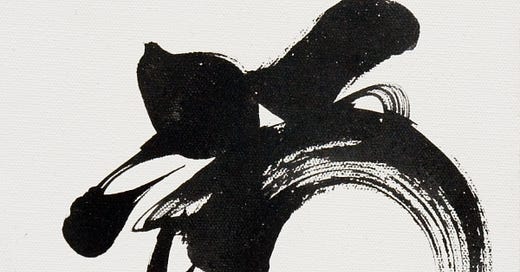


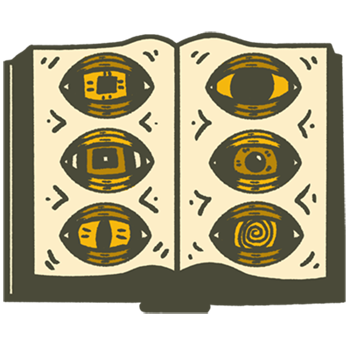
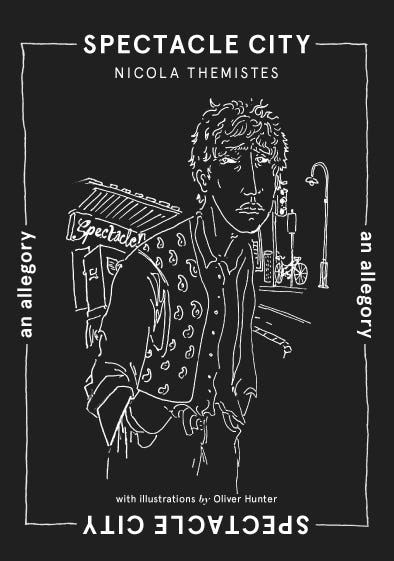

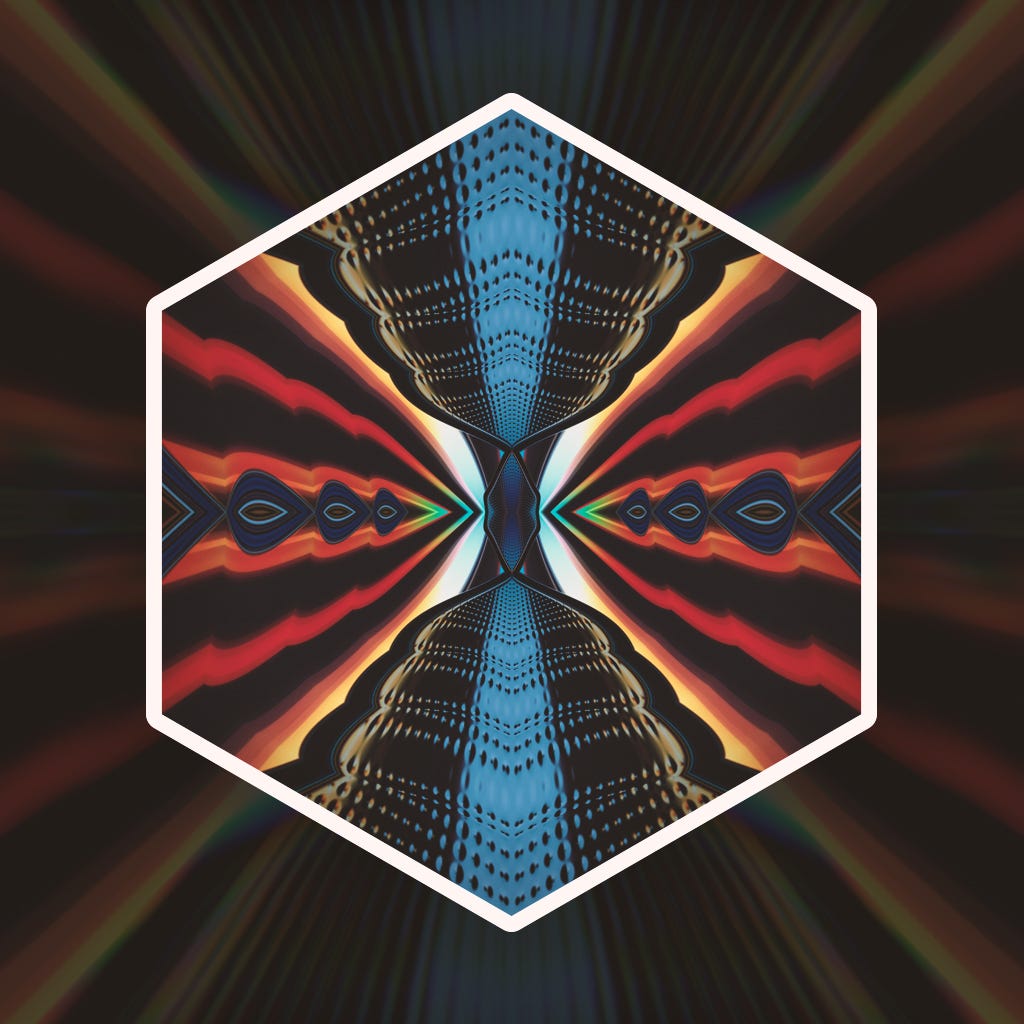

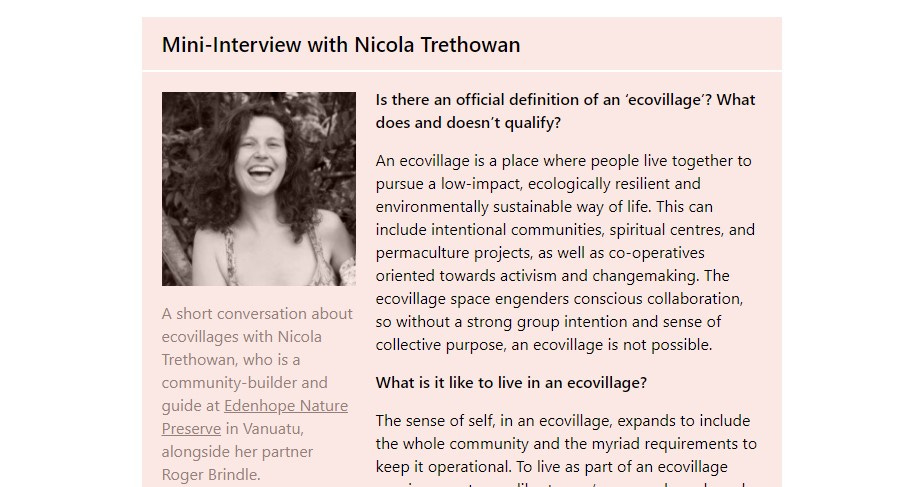
This was beautiful. Just a delight to read.
I’m so excited about the new newsletter Nicola, I have not been an avid Milton reader but I’d love to explore the nuances from your perspective.
I agree creative work can be exhausting if we attach the significant effort we put into the process to the demands of success the world puts on us. It is not always proportional in nature. Creativity is like harnessing chaos, like catching a lightning in a bottle, it is bound to create enormous mess but then as we keep on the path and travel further into our deeper spaces of awareness, we reach the point where, as you said, become conscious observers , merely noticing things in absence of thoughts and saying them exactly as they are without judgements. I think the whole process is meant to refine our awareness.